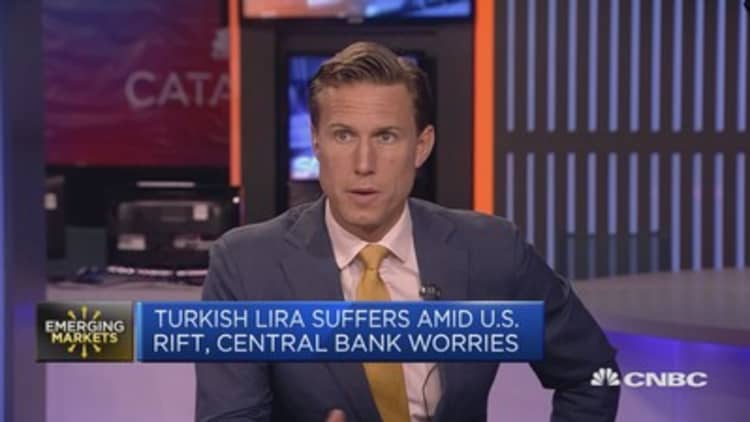
With financial turmoil in Turkey roiling the country's assets, analysts are busy contemplating which other countries could be exposed and what this could mean for international investors.
Turkey has been in economic difficulties since the start of the year. Its currency has lost about 33 percent of its value on the back of large fiscal stimulus, growing inflation and a hefty current account deficit. There's also been intervention from President Recep Tayyip Erdogan on the central bank's policy decisions which continues to surprise investors and accentuate the fall in the currency.
European banks
Media reports suggested Friday that officials at the European Central Bank (ECB) are concerned over southern European banks, which have lent significant amounts of money in Turkey. This suggests that investors holding stock in European banks could be at risk. The ECB declined to comment on the reports.
Data from the Bank for International Settlements (BIS) — often called the central bank of central banks — shows that Spanish banks are owed $83.3 billion by Turkish borrowers; French lenders $38.4 billion; and banks in Italy are owed $17 billion. Regulators in Europe are reportedly worried that the weaker currency will lead to defaults in foreign loans.

Shares of , BNP Paribas and BBVA fell around 3 percent Friday morning, after being cited as the European banks with the highest exposure to Turkey. This dragged the wider market down with the pan-European Euro Stoxx 600 down 0.7 percent by 9:00 a.m. London time and the banking index dropping 1.3 percent. Carsten Hesse, a European economist at Berenberg, said in a research note that some euro zone banks are under pressure "due to their direct equity exposure to Turkish banks or participation in syndicated loans — a loan offered by a group of lenders."
Japan, US
When asked about the impact of the ongoing troubles in Turkey, Timothy Ash, a senior emerging markets strategist at Bluebay Asset Management, told CNBC via email that "it's likely mostly banking exposure at this stage."
However, he added that exposure is "pretty international." "European, U.S., Japan, China, Middle East — everyone," he added.
The BIS cross-border figures also show that Japanese banks are owed $14 billion, U.K. lenders $19.2 billion and the United States about $18 billion.
Lira continues to plunge
On Friday morning, the lira hit another record low, plunging to 5.9976 against the U.S. dollar. Erdogan himself spoke out to try to calm the economic storm, saying Friday morning that Turkish citizens should not be worried about the weaker currency.

"There are various campaigns being carried out. Don't heed them," the president said. "Don't forget, if they have their dollars, we have our people, our God. We are working hard. Look at what we were 16 years ago and look at us now," Erdogan told supporters.
'Modest' impact
Despite Turkish fears spreading to the rest of Europe there were analysts still fairly sanguine on the risks for the global economy and foreign investors. Roger Jones, head of equities at investment fund London and Capital, noted there could be repercussions for European insurers, although "modest."
"Several European banks plus insurers have exposure (to Turkey) but it is modest in the context of the overall group. Overall, Turkey will be a small component of European company profits with no specific name stating out as overly exposed," Jones told CNBC via email.
"As far as the U.K., HSBC has exposure to Turkey but it is modest in the context of the group, as does Aviva," he noted regarding U.K. stocks in particular.
Bond markets
Meanwhile, the economic woes in Turkey could also bring problems for European sovereign debt, potentially affecting bond investors and governments who rely on the debt markets to fuel their spending plans.
"I don't expect any euro zone country bond yields to really suffer due to Turkey, but on the margin the countries in the euro zone with the highest bond yields would probably be the ones who could feel some minor impact," Hesse from Berenberg bank told CNBC via email.
He mentioned that in this case Greece and Italy could be hit as well as Spain, "due to its higher-than-average bank exposure to Turkey."
However, Ash played down risks that Turkey could become a sovereign debt problem. "I don't see huge global contagion. Turkey is still a relatively small economy – (worth) $850 billion, and unlikely this will be sovereign debt event," Ash said in an email.
Wait-and-see mode
Investors are taking a wait-and-see approach to the economic problems in Turkey, mainly because it is difficult to predict what the central bank might do.
"Our view is to remain on the side lines for now and continue to have no exposure to Turkey until there is no clarity on the central bank's economic and monetary plan," Jones from London and Capital told CNBC.
"The wider implications are probably more sentiment driven rather than a cause for fundamental concern currently, but this could change if negative sentiment drives a more cautious attitude which becomes self-fulfilling," he added.


